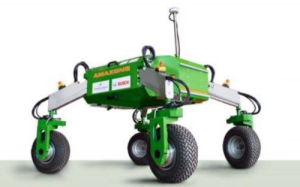ORLANDO, Fla. – En 2014 los robots han comenzado a complementar nuestra industria agrícola ya automatizado con el objetivo de alimentar a los 9 mil millones de personas predijo para poblar la Tierra en el año 2050. No sólo necesitará la producción agrícola de duplicar para alimentar a toda esa gente, pero productividad debe aumentar en un 25%, de acuerdo con The Robot Informe autor Frank Tobe.
«En 2014, los robots han comenzado en serio como complemento a la industria de la agricultura ya automatizado», dijo Tobe EE Times. «En 2020 muchas de las tareas agrícolas se llevarán a cabo con dispositivos robóticos autónomos».
Según Tobe, los robots están permitiendo a los agricultores a saltar por encima de los avances incrementales lento de automatización de la agricultura, pasando directamente a automatizar totalmente la mayoría de los aspectos de las tareas agrícolas – de injerto, de la siembra, de la cosecha, a la clasificación, el envasado y el boxeo. Además, los drones se están utilizando para determinar donde los cultivos necesitan fertilizantes o pulverización, y en algunos casos realmente hacer el trabajo ellos mismos.
Para obtener una imagen completa del impacto agrícola de robots en 2014 (además de los ordeñadores de vacas automáticas, que fueron excluidas), Tobe encuestó a 60 fabricantes de robots agrícolas y obtuvo 27 respuestas a su cuestionario. (Usted notará la ausencia de John Deere y otros grandes nombres. Se trata de empresas públicas que no están permitidos para responder algunas de las preguntas de la encuesta, y por lo tanto no respondió.) Esta presentación ilustra la amplitud de automatización agrícola y cómo los robots están llenando en los últimos nichos de automatización necesarios para alimentar a las masas del futuro. (Muchos de los robots que se muestran están todavía en pruebas, pero programado para ser lanzado comercialmente en 2015-2016.)
 Haga clic en la imagen robot siguiente para iniciar la presentación de diapositivas: Nota, presentación de diapositivas se abre en una nueva pestaña en tu navegador.
Haga clic en la imagen robot siguiente para iniciar la presentación de diapositivas: Nota, presentación de diapositivas se abre en una nueva pestaña en tu navegador.
 Lori McLeese
Lori McLeese


 Amy Monticello’s work has appeared in The Iron Horse Literary Review, Brevity, Redivider, The Rumpus, and elsewhere. She is the author of Close Quarters (Sweet Publications), and an assistant professor at Suffolk University. She lives in Boston with her husband and daughter.
Amy Monticello’s work has appeared in The Iron Horse Literary Review, Brevity, Redivider, The Rumpus, and elsewhere. She is the author of Close Quarters (Sweet Publications), and an assistant professor at Suffolk University. She lives in Boston with her husband and daughter.


